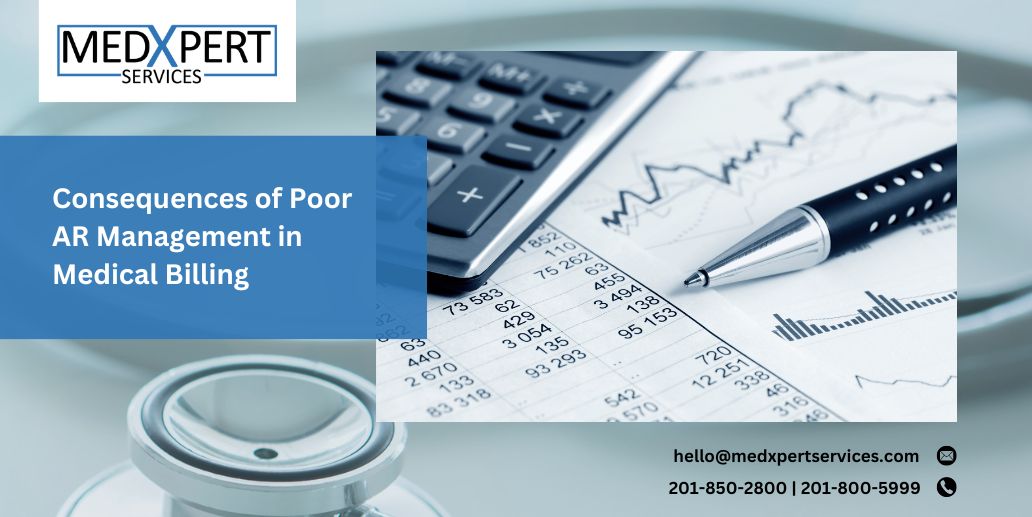Accounts receivable (AR) in medical billing refers to the unpaid balances due to healthcare providers for services rendered. Proper AR management is crucial for maintaining cash flow, reducing billing errors, and avoiding financial strain on medical practices. Implementing timely collections and minimizing payment delays are key to financial stability
This blog will explore the significant consequences of poor AR management. Understanding these issues will guide organizations to improve the accounts receivable process in medical billing.
What are the Consequences of Inefficient Management of Account Receivable in Medical Billing?
Inefficient management of accounts receivable (AR) in medical billing can lead to severe negative outcomes, disrupting cash flow and creating financial risks. These issues affect the financial stability of healthcare providers, emphasizing the need to address inefficiencies promptly to maintain operational health.
Cash Flow Disruptions
- Cash Shortages: Inefficient AR management can lead to cash shortages, affecting the ability to handle immediate financial obligations smoothly.
- Salary Delays: Slow payment collection may cause delays in salaries, potentially affecting employee satisfaction and performance.
- Expense Coverage Issues: Continuous cash flow problems can make it difficult to cover routine expenses, disrupting normal business functions.
Disruptions in cash flow are a major consequence of poor AR management, leading to financial strain and operational inefficiencies in healthcare practices.
Escalated Financial Expenses
- Expensive Financing: To manage cash flow gaps, practices may resort to costly financing options, which add to overall financial burdens.
- Accumulating Debts: Frequent borrowing to manage cash issues can lead to a heavy debt load, putting the practice’s financial health at risk.
- Reduced Profit Margins: Increased financial costs from loans and interests shrink profit margins, impacting the practice’s ability to sustain itself.
Practices often turn to high-cost financing solutions due to inefficient AR management, which worsens financial strain and impacts overall stability.
Patient Relationship Strain
- Confidence Loss: Billing errors and inconsistencies can reduce patient confidence in the provider’s management, affecting their trust in the service.
- Patient Complaints: Issues like delayed or incorrect billing can lead to patient complaints, causing dissatisfaction and a negative experience.
- Reduced Loyalty: Poor AR practices may drive patients to switch providers, reducing patient loyalty and affecting long-term revenue.
Inefficient AR management can damage the provider-patient relationship, leading to loss of trust and a decline in patient retention.
Profit Decline
- Revenue Loss: Inefficient AR processes delay payment collections, leading to decreased revenue and limiting the practice’s financial growth.
- Increased Operational Costs: Managing AR inefficiencies can increase operational costs, further reducing profitability.
- Investment Restrictions: Reduced profitability limits the ability to reinvest in the practice, stifling opportunities for growth and advancement.
Poor AR management directly impacts profitability, hindering a healthcare provider’s ability to grow and maintain a competitive edge.
Risk of Unrecoverable Debts
- Higher Write-Offs: Ineffective AR management increases the likelihood of accounts becoming uncollectible, leading to higher write-offs.
- Credit Rating Impact: Significant bad debts can harm the practice’s credit rating, complicating access to future financing and investments.
- Resource Diversion: Handling bad debts consumes resources that could otherwise be directed towards enhancing patient care and other priorities.
The risk of bad debt rises with poor AR management, severely impacting a practice’s financial health and ability to invest in improvements.
Causes Accounts Receivable to Increase in Medical Billing
An increase in accounts receivable (AR) in medical billing is often caused by various challenges that hinder the timely collection of payments. These issues can stem from patient and insurance delays, as well as internal billing errors, making efficient management crucial for maintaining healthy cash flow and avoiding financial setbacks.
- Delayed insurance reimbursements
- Billing and coding errors
- Patient non-compliance with payments
- Lack of follow-up on outstanding claims
Efficient AR management is vital to ensure timely payments and reduce financial risks associated with increased AR in medical billing.
Steps to Address and Improve Inefficient AR Management
To counter the negative effects of poor AR management, healthcare providers can implement specific strategies to streamline billing and payment processes. Adopting effective accounts receivable solutions can enhance cash flow, reduce payment delays, and minimize financial risks, ensuring the organization’s financial health.
Enhanced Billing Processes
- Accelerate Invoice Generation: Speeding up the creation of invoices ensures that billing is prompt, reducing the time between service delivery and payment.
- Reduce Input Mistakes: Optimizing billing procedures minimizes errors caused by manual entries, helping to maintain accuracy and efficiency.
- Timely Payment Notifications: Setting up timely reminders for payments helps to keep the process on track, reducing delays and improving collections.
Enhancing billing processes ensures that payments are received promptly and disputes are minimized, contributing to a more predictable cash flow.
Proactive AR Monitoring
- Regular Financial Reviews: Routine checks of AR help to spot issues early, allowing timely actions to be taken on overdue accounts.
- Quickly Address Late Payments: Identifying overdue payments early allows for immediate follow-up, reducing the likelihood of accounts becoming uncollectible.
- Decrease Uncollected Amounts: Proactive oversight and management reduce the risk of bad debts, safeguarding the financial health of the practice.
Proactive monitoring of AR allows healthcare providers to identify problems early, ensuring steady cash flow and preventing financial setbacks.
Clear Payment Policies
- Communicate Payment Terms Clearly: Providing clear payment guidelines ensures patients understand their obligations, reducing confusion and disputes.
- Define Due Dates and Steps: Clearly specifying payment deadlines and procedures helps patients know what is expected, encouraging prompt payments.
- Minimize Conflicts: Transparent policies help to reduce misunderstandings, fostering a smoother payment experience for patients.
Clear and transparent payment policies improve communication and understanding, promoting timely payments and reducing the potential for disputes.
Automated Billing Systems
- Reduce Administrative Work: Automation of billing processes minimizes manual tasks, freeing up staff to focus on more critical activities.
- Automate Reminders: Automated systems can send payment reminders, ensuring consistent follow-up and reducing the time to collect payments.
- Monitor Payment Status: Tracking payments automatically helps to quickly identify delays, allowing for faster resolution of any issues.
Automating invoice management enhances efficiency by reducing errors and speeding up the billing process, making AR management more effective.
Early Intervention in Collections
- Prompt Follow-Up: Addressing overdue accounts quickly prevents them from becoming larger issues, reducing the likelihood of long-term payment problems.
- Customized Collection Tactics: Using tailored approaches for different accounts ensures a professional and effective collections process.
- Maintain Professionalism: Handling collections with care maintains the patient-provider relationship, while still ensuring payments are received on time.
Early intervention in collections helps healthcare providers recover payments more effectively, preventing financial strain and maintaining cash flow stability.
Final Thoughts
Inefficient management of accounts receivable in medical billing can significantly disrupt cash flow, escalate financial burdens, and strain patient relationships. Addressing these challenges requires a proactive approach that includes streamlining billing processes, enhancing AR monitoring, and implementing clear payment policies to ensure timely collections and minimize financial risks.
By adopting automated billing systems and intervening early in collections, healthcare providers can improve their financial stability and operational efficiency. Focusing on efficient AR management not only protects the financial health of the practice but also supports a positive patient experience and sustainable growth in the long term.






